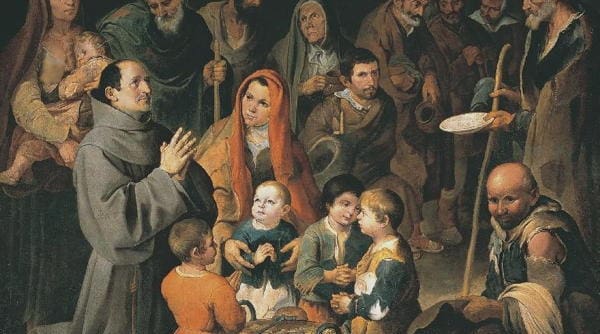Thanksgiving has been in all ages the characteristic of the saints. Thanksgiving has been their favorite prayer; and when their love has been grieved because men were unthankful, they have called on the animals, and even on inanimate creatures, to bless God for His goodness.
St. Lawrence Justinian has a beautiful passage on thanksgiving in chapter 28 of his Treatise on Obedience:
Whosoever should try to lay open all God’s blessings to the full would be like a man trying to confine in a little vase the mighty currents of the wide ocean; for that would be an easier work than to publish with human eloquence the innumerable gifts of God. Yet although these are unspeakable, both from their multitude, their magnitude, and their incomprehensibility, they are by no means to be concealed in silence, or left without commemoration, although it be impossible to commemorate them adequately. They are to be confessed with the mouth, revered in the heart, and religiously worshiped, as far as the littleness of man can do so. For although we cannot explain them in words, we can make acknowledgment of them in the pious and enlarged affection of our hearts. Indeed, the immense mercy of our Eternal Creator condescends to approve not only what man can do, but what he would desire to do; for the merits of the just are counted up by the Most High, not only in the doing of the work, but in the desire of the will.
In one of the revelations of St. Catherine of Siena, God the Father tells her that thanksgiving makes the soul incessantly delight in Him, that it frees men from negligence and lukewarmness altogether and makes them anxious to please Him more and more in all things.
Our Lord gives the increase of thanksgiving as a reason to St. Bridget for the sacrifice of the Mass. “My body,” says He, “is daily immolated on the altar, that men may love me so much the more, and more frequently call to mind my blessings.”
“Happy is he,” says St. Bernard, “who, at every grace he receives, returns in thought to Him in whom is the fullness of all graces; for if we show ourselves not ungrateful for what He has given us, we make room for still further graces in ourselves.” In another place he says, “Speak to God in thanksgiving, and you will get graces more and more abundantly.”
So St. Lawrence Justinian says, “Only let God see you are thankful for what He has given you, and He will bestow more gifts upon you, and better gifts.”
St. Mary Magdalene of Pazzi also received a revelation, in which she was told that thanksgiving prepared the soul for the boundless liberality of the Eternal Word.
Now stop, dear reader, and meditate for a few minutes on the Eternal Word: remember which of the three Divine Persons He is, the Second Person, the eternally begotten Word of the Father, the splendor of His Majesty, uncreated Wisdom, the same Person who was incarnate and crucified for us, the same who sent us the Holy Spirit, who gave us Mary, who gives us Himself in the Blessed Sacrament, in whose mind revolves at this moment the countless lusters of all possible creations; then think what His liberalities must be — no bound or measure to them. We cannot count their number, nor exhaust their freshness, nor understand their excellence, nor hold their fullness, nor give intelligible human names to their kinds, inventions, varieties, and wonders.
Oh, that we had greater devotion to the Person of the Eternal Word, that we would read about Him the wonders the Church can tell us, and then meditate and make acts of love on what we read! This is the true way to increase our devotion to His most dear humanity, and to learn how to watch at His Crib, to weep over His Cross, to worship at His tabernacle, and to nestle in His Sacred Heart.
Ask St. Michael, St. John the Evangelist, and St. Athanasius, to get you this devotion; they have a specialty for it; and see how you will run the way of God, when its heat has made a furnace of your heart.
Remember also that He Himself has told us, through this revelation to His servant, that thanksgiving prepares the soul for His amazing liberalities.
You see, you must begin this day and hour quite a new and more royal sort of thanksgiving than those mere infrequent, formal, respectful civilities by which you have heretofore been content to acknowledge your accumulated obligations to our dearest Lord. Now promise Him this, and then, with a hotter heart, read on.
St. Bonaventure tells us that our Blessed Lady gave thanks to God without intermission, and lest in common greetings she should be distracted from the praises of God, she used to reply, when anyone saluted her, “Thanks be to God!” and from her example several saints have adopted the same practice.
The Jesuit Father Didacus Martinez, called the Apostle of Peru because of his zeal for souls and his labors in that province, used to say daily four hundred times, and often six hundred times, “Deo gratias,” and he had some beads on purpose to be accurate. He tried to induce others to practice the same devotion, and he declared that he knew there was no short prayer more acceptable to God, if only it be uttered with a devout intention. It is also mentioned of him in the summary of his process for canonization that his distinct acts of divine love often amounted to several thousands in the day.
Lancisius quotes from Philo a beautiful tradition among the Jews, to this effect: when God had created the world, He asked the angels what they thought of this work of His hands. One of them replied that it was so vast and so perfect that only one thing was wanting to it, namely, that there should be created a clear, mighty, and harmonious voice that should fill all the quarters of the world incessantly with its sweet sound, thus day and night to offer thanksgiving to its Maker for His incomparable blessings.
Ah! They knew not how much more than that the Blessed Sacrament was one day to be! Thus, our thanksgiving should not be an exercise of devotion practiced now and then. It should be incessant, the voice of a love that is ever living and fresh in our hearts.
In several of the texts that I have already quoted, St. Paul speaks of prayer with thanksgiving: as if there was to be no prayer of which thanksgiving did not form a part; and this also would illustrate what I said of the spirit of the Eucharist being found in every part and act of Catholic devotion.
“I think,” says St. Gregory of Nyssa, that if our whole life long we conversed with God without distraction, and did nothing but give thanks, we should really be just as far from adequately thanking our heavenly Benefactor as if we had never thought of thanking Him at all. For time has three parts — the past, the present, and the future. If you look at the present, it is by God that you are now living; if the future, He is the hope of everything you expect; if the past, you would never have been if He had not created you. That you were born was His blessing; and after you were born, your life and your death were, as the apostle Paul says, equally His blessing. Whatever your future hopes may be, they hang also upon His blessing. You are master only of the present, and therefore, if you never once intermitted thanksgiving during your whole life, you would hardly do enough for the grace that is always present; and your imagination cannot conceive of any method possible, by which you could do anything for the time past, or for the time to come.
In addition to these authorities, we must not forget to add the number of thanksgivings that have been indulgenced by the Church, in order that she may the more effectually lead her children to glorify God in this way. We shall have occasion, afterward, to revert to the fact that many of these devotions are thanksgivings to the Most Holy Trinity for the gifts and graces bestowed upon our Blessed Lady.
+
This article is adapted from a chapter in Fr. Frederick Faber’s The Little Book of Holy Gratitude, which is available from Sophia Institute Press.
Institute Press.
Art for this post on the saints and thanksgiving: Saint Didacus [Diego] of Alcalá feeding the poor, Bartolomé Esteban Murillo, 1645-1646, PD-US author’s life plus 100 years or less. Cover of The Little Book of Holy Gratitude used with permission.
To read and learn more from the saints click HERE.




